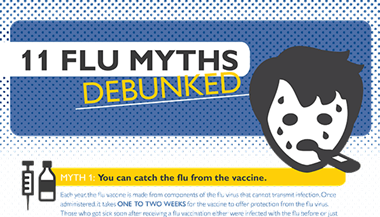Flu: Answers from Physician Michael Albert
Featured Expert:
Each year, up to 20 percent of Americans get the flu, sending many to the hospital with severe complications, and in the 2022 - 2023 season, the flu is peaking early and significantly. Learn how you and your loved ones can stay healthy with information from internal medicine physician Michael Albert.
How can I prevent the flu?
Albert advises the following:
- Get a flu shot. The flu vaccine is the best way to prevent severe illness from the virus, which is especially important this winter as a severe flu season is coinciding with surges in COVID-19, RSV (respiratory syncytial virus), and other respiratory illnesses.
- Wear a mask when around infected people and consider masking in crowded or public areas during flu season.
- Limit contact with infected people.
- Wash your hands frequently.
- Avoiding touching your mouth, eyes and nose.
- To stop the virus from spreading, stay at home if you’re sick, and encourage others to do the same.
- If you have any symptoms of a respiratory illness, even if they are mild, wearing a mask can help protect others.
Is it too late to get my flu shot?
Albert points out that the vaccine takes around two weeks to become effective, so it’s best to get the vaccine before flu season has begun. “You’re better late than never, though,” he says. “Even as spring approaches, you can still benefit from the vaccine — especially if the flu season lasts longer than usual. This may be more likely to happen in the COVID-19 era, when the usual seasonal cycle of viruses has been disrupted.”
What’s the difference between the flu and the common cold?
The common cold and the flu are caused by different viruses, Albert explains.
"Patients with the flu often have a high fever, headache, extreme fatigue, and severe aches and pains. Those symptoms aren’t usually seen in those who have the common cold.
"The flu is far more severe. Colds usually clear up on their own after a few days, but the flu can progress to pneumonia or even death."
Are antiviral drugs helpful for the flu?
Albert notes that antiviral drugs can be used to help sick people, particularly those who are at higher risk of severe influenza, recover faster. Your doctor may prescribe them to prevent the flu in some cases — especially if you are at higher risk of complications and in close contact with people who have the flu.
People most likely to benefit from antiviral medicines include:
- Children under age 5
- Adults older than 65
- Those who have lung conditions such as asthma or emphysema
- People with complex medical conditions
“If you fit into one of these groups, talk to your doctor to see if you should take antiviral drugs. Taking them within two days of getting sick can help you get back on your feet sooner and avoid potentially deadly complications,” he says.
How do I know if I have COVID-19 or the flu?
Albert says, “The best thing you can do if you develop symptoms of the flu or COVID-19 is to take an ’at home’ COVID test, since there are many similar symptoms of both viruses. If you have COVID-19, you may be a candidate for specific medicines which typically need to be started within five days of the beginning of COVID symptoms.
“There aren’t home tests available for flu at this time, so if your COVID test is negative and you have flu symptoms, it’s more likely you have the flu. But the best thing you can do for both of these serious viruses is to make sure you are up to date on your vaccines!”







